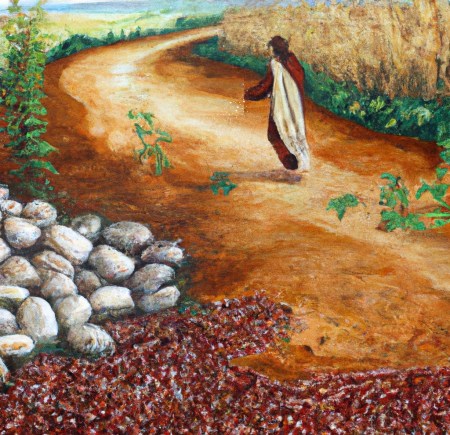Fifth Sunday of Easter
By Fr. Victor Feltes
Imagine if Osama bin Laden, after masterminding terrorist attacks, had repented and begun proclaiming Jesus Christ and the Gospel? Christians might understandably still be afraid of him and wary of his claimed Christian conversion. In the first century, prior to his famous conversion, St. Paul had intensely persecuted God’s Church and tried to destroy it. At the stoning of St. Stephen the Martyr he had guarded the cloaks of the murderers. Before encountering Christ on the way to Damascus, he was “breathing out murderous threats against the Lord’s disciples.” He had sought and obtained letters from the high priest empowering him to arrest any Christians he found in that city and take them back to Jerusalem as prisoners. So after his conversion, when “he arrived in Jerusalem, he tried to join the disciples, [but] they were all afraid of him, not believing that he was a disciple.”
Yet it was all real and true. The amazing conversion of St. Paul, that fierce enemy of the early Church, is an authentic miracle in real history which has borne true fruit in Christ. St. Paul founded and fostered early Christian communities, wrote more books of the Bible than any other man, and had a hand in saving many souls. He also discovered good fruits for himself, including Christian peace and joy. St. Paul told the Philippians he had exchanged everything from before as if it were mere rubbish for “the supreme good of knowing Christ Jesus my Lord.” Such are fruits of a life in Christ.
Jesus tells his disciples in today’s gospel, “I am the vine, you are the branches.” He says, “I am the true vine, and my Father is the vine grower. He takes away every branch in me that does not bear fruit, and every one that does he prunes so that it bears more fruit…” Notice how Jesus says God prunes those who are in him. Pruning clips off of a vine branch certain shoots or leaves in order to help the branch to be healthy and grow and produce more and better fruit. If vine branches were conscious, self-aware like us, how would this pruning feel? Painful, I imagine. Even if a branch loved producing fruit and wished to produce much more, how would a vine branch feel about such pruning if it did not understand this pruning’s purpose? There is a danger for a Christian who expects only comforts in this life and is surprised by the coming of any trials.
Consider the life of St. Paul. He suffered and endured many trials. Five times he received thirty-nine lashes from Jewish foes, three times he was beaten with rods, one time he was stoned, three times he survived shipwrecks, and ultimately he was beheaded by the Romans. St. Paul was not always liked, even by fellow Christians. It appears some Christians at Corinth said things like, “His letters are severe and forceful, but his bodily presence is weak and his speech is contemptible.” St. Paul’s letters reflect that the first Christian communities were far from perfect and they gave him many stressful problems to deal with. He writes of having beautiful mystical experiences but also of a “thorn” in his flesh and physical illness. St. Paul’s life was not always comfortable. However, he wrote to the Philippians, “I have learned to be content whatever the circumstances. I know what it is to be in need, and I know what it is to have plenty. I have learned the secret of being content in any and every situation, whether well fed or hungry, whether living in plenty or in want. I can do all this through him who gives me strength.”
When St. Paul, now amongst the saints and angels in heaven, looks back on all his troubles and beholds all their good fruits, does he believe that it was worth it? Of course he does. And he cheers us on alongside that “great cloud of witnesses,” prayerfully interceding for us to “persevere in running the race that lies before us while keeping our eyes fixed on Jesus.” In both good times and in bad, Jesus counsels us to remain in him. “Whoever remains in me and I in him will bear much fruit… By this is my Father glorified…” And in this will be our glory too.














